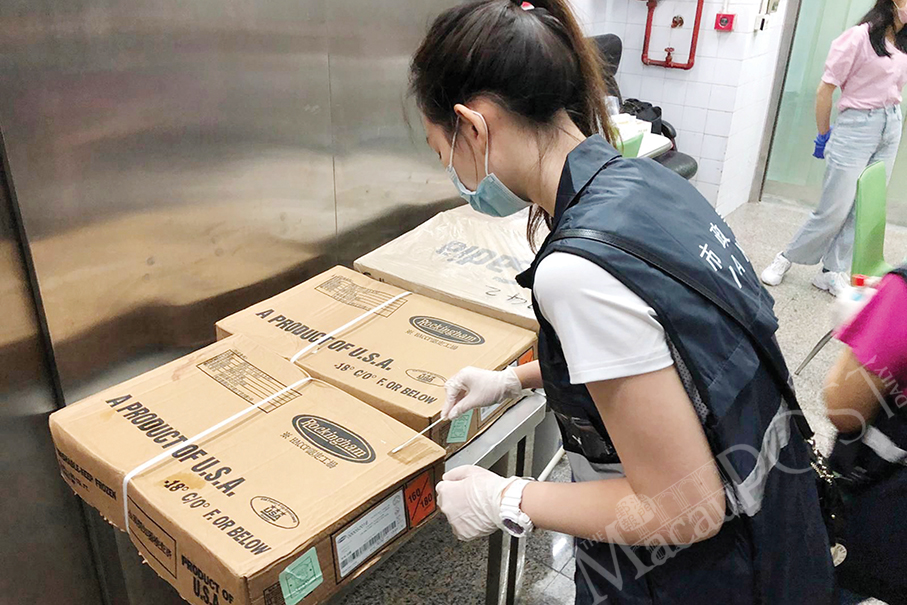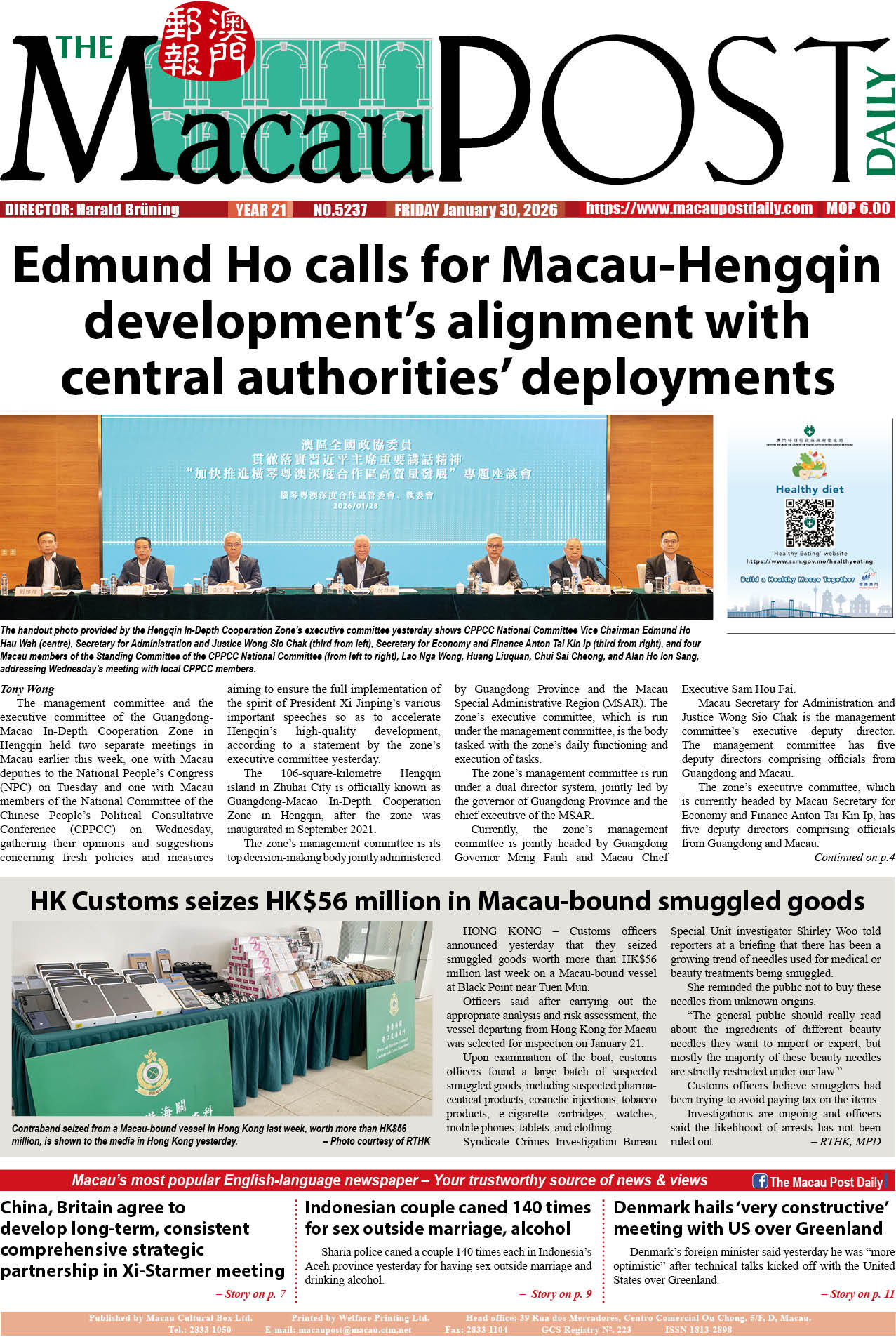Addressing yesterday’s daily press conference about Macau’s novel coronavirus (COVID-19) situation, Secretary for Economy and Finance Lei Wai Nong announced a raft of financial support measures with the aim of relieving the heavy burden on residents and businesses amid the “huge” impact on the local economy due to the epidemic.
Lee revealed a string of measures such as net profit tax and income tax deductions, various tax exemptions, a special interest-free loan scheme for small- and medium-sized enterprises (SMEs), the government paying each households’ whole water and electricity bills for three months, and, last but not least, a 3,000-pataca consumption voucher to each local resident.
Lei said that the government “feels deeply” that residents and companies alike are suffering from the uncertainty caused by the ongoing epidemic.
Lei noted that for some of the financial support measures, such as tax deductions and exemptions, the government will have to submit the respective bills to the legislature for debate and vote, before they can be implemented – provided that they are passed by lawmakers. The other measures can be implemented through the drafting of administrative regulations (by-laws) or chief executive orders, Lei said.
According to the Macau Basic Law, all tax amendments proposed by the government must be passed by the legislature to become law.
Lei made the announcements during a 100-minute press conference yesterday evening at the Health Bureau (SSM) adjacent to the public Conde de São Januário Hospital Centre. The press conference, which started at 5 p.m., was also attended by Secretary for Social Affairs and Culture Elsie Ao Ieong U and other senior officials.
Measures to cost 20 billion patacas
According to Lei, the government expects to spend 20 billion patacas on its support measures as well as increased spending on infrastructures. Lei said that the expenditure was expected to amount to 27 billion patacas after also including the annual “wealth-sharing” handouts which the government will start paying in April.
The government’s financial reserves amount to over 0.56 trillion patacas.
In previous years, the government customarily started paying the handouts in July. Lei announced late last month the earlier payout of this year’s annual handouts in response to the adverse impact of the COVID-19 epidemic on the local economy.
Stay at home!
During yesterday’s press conference, both Lei and Ao Ieong repeatedly urged residents to persevere in staying at home and refrain from going out. Both noted that the government has noticed that residents have started to let their guard down and more residents have been out and about in recent days. Both said that the situation could possibly cause a community outbreak, in which case all the government’s efforts against the viral threat would be wasted.
Tax deductions & exemptions
According to Lei, the government proposes a tax deduction of up to 300,000 patacas in the net profit tax for 2019. The proposed tax deduction would benefit 2,970 companies, Lei said.
According to Lei, the government’s proposed tax benefits will include a rebate of 70 percent of the personal income tax for 2018 to the respective taxpayers, with a maximum rebate of 20,000 patacas. The measure would benefit 170,000 employees, Lei said.
According to Lei, the government also proposes an increase in the percentage of the taxable income from the current 25 percent to 30 percent for this year, which would benefit 180,000 employees.
According to Lei, the government proposes to exempt residential households from paying their property tax for 2019, covering 180,000 households. Lei said that the government also proposes to reduce the property tax on commercial premises by 25 percent, covering 25,000 commercial premises.
According to Lei, the government’s proposed tax exemptions will also include an exemption of the tourism tax (five percent) on hotels, bars, gyms, karaoke bars and similar businesses for six months, covering 854 businesses.
Interest-free loans for SMEs
For other non tax-related measures, Lei said that the government will launch a “special” interest-free loan scheme for local SMEs which have been operating for less than two years, with a maximum amount of 600,000 patacas. The beneficiaries can return the loan within up to eight years.
Lei said that the government will issue its annual health vouchers (600 patacas per person) – to which only permanent residents are entitled – twice this year. Usually, they are only issued once per annum.
According to Lei, the government will also pay the full amount of all residential households’ water and electricity bills for three months.
Lei also said that the government will strengthen its occupational training programmes for employees working in the construction and engineering sector after the epidemic has been brought under control.
Consumption e-vouchers
Lei said that the government will issue a 3,000-pataca consumption e-voucher to each local resident after the epidemic has eased, with the aim of boosting local consumption – which has been hit hard by the current epidemic – and benefiting SMEs in various sectors.
Lei said that the consumption e-voucher will be a card and the scheme will be operated by MacauPass.
Lei said that with the aim of ensuring the effectiveness of the consumption e-voucher scheme to boost local demand, the holders will need to use it within three months and they can only spend up to 300 patacas per day. The scheme will cover businesses such as restaurants, retail outlets and department stores, Lei said, adding that the government expects to spend 2.2 billion patacas on the scheme.
Limiting flow of people
Meanwhile, Lei said that the government has noticed that currently there are still thousands of residents and non-resident workers travelling between Macau and Zhuhai every day, adding that the government would possibly implement tougher measures limiting, if necessary, the flow of people travelling between the two cities. Lei was quick to add that now is not the right time to reveal the details of the measures.
Lei said that residents have started to let their guard down in recent days and more residents have been out and about, such as in San Kio district and in the neighbourhoods around Avenida de Horta e Costa. During the press conference, Lei showed the media a number of photos showing many residents going out and shopping in these neighbourhoods. Lei urged residents to stay at home and refrain from going out and attending gatherings. Lei said that residents should also avoid leaving Macau.
No new case in 9 days
Macau has not confirmed a new COVID-19 case for nine consecutive days, since last Tuesday. The government said earlier this week that its measures against the virus have started to deliver results.
Worries that govt’s efforts would be wasted
Lei underlined the “hard-won” achievements of the local government’s measures against the virus, which he said also represent the joint efforts of all residents and local companies. Lei said that the achievements involve a high cost, urging residents to persevere in keeping up all the necessary preventive measures so that all the government’s efforts against the viral threat would not be wasted.
Ao Ieong said that despite no new COVID-19 cases having been confirmed in Macau for nine consecutive days, now was still a critical moment for the government’s epidemic prevention work, urging residents not to go out unless necessary. She warned that otherwise a community outbreak could possibly happen, in which case all the efforts that the city has mustered against the viral threat would be wasted.
Ao Ieong also reaffirmed that the local government will not close any of the city’s border checkpoints. She said that closer cooperation between Macau and Zhuhai would be more effective in bringing the epidemic under control.
Ao Ieong also said that there were many people around Avenida de Horta e Costa, Rotunda de Carlos da Maia, and Rua da Emenda yesterday. She warned that if a community outbreak happened, it would be an internal problem rather than an issue about the flow of people passing through Macau’s border checkpoints. The policy secretary said she hoped residents could “control their own feet” – refraining from going out and using border checkpoints.
3rd patient discharged
During yesterday’s press conference, Lei Wai Seng, the public hospital’s clinical director, announced the discharge of the third COVID-19 patient – who also happened to be the third confirmed case in Macau – yesterday afternoon, a 57-year-old woman from Wuhan.
Macau’s first two COVID-19 patients, a 52-year-old woman and a 21-year-old woman from Wuhan, were discharged from hospital on Thursday last week and Wednesday this week respectively.
Including yesterday’s case, three COVID-19 patients in Macau have been discharged. Macau has so far confirmed 10 COVID-19 cases, comprising seven tourists from Wuhan and three Macau residents.
According to Lei, the third confirmed patient was discharged after 17-days treatment in the public hospital’s isolation ward. Lei said that the treatment bill of the patient discharged yesterday amounts to 52,000 patacas and that she has paid it. The other two patients have still to pay up.

A photo taken by the government showing pedestrians walking in a street near the Red Market yesterday is displayed on a screen during yesterday’s daily press conference at the Health Bureau (SSM) about the city’s COVID-19 situation, which was attended by senior officials such as Secretary for Economy and Finance Lei Wai Nong (fifth from left), Secretary for Social Affairs and Culture Elsie Ao Ieong U (fifth from right), SSM Director Lei Chin Ion (fourth from right) and Lei Wai Seng (third from right), clinical director of the public Conde de São Januário Hospital Centre. Photo: Tony Wong








